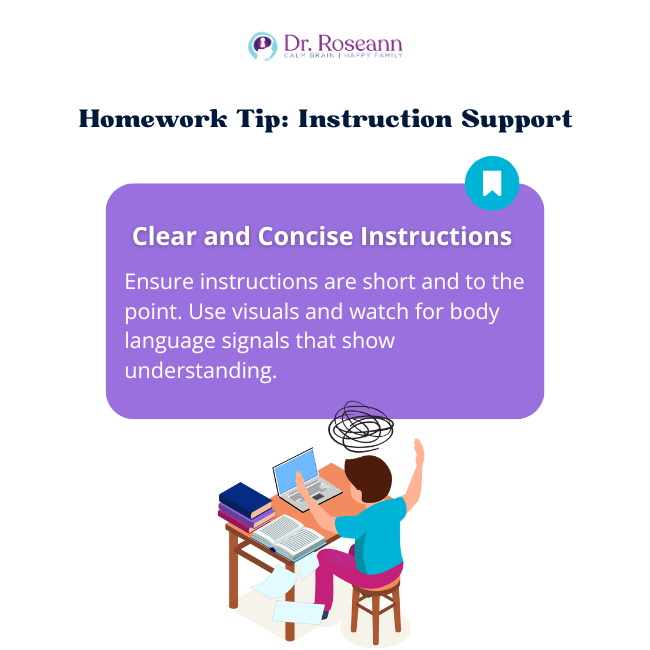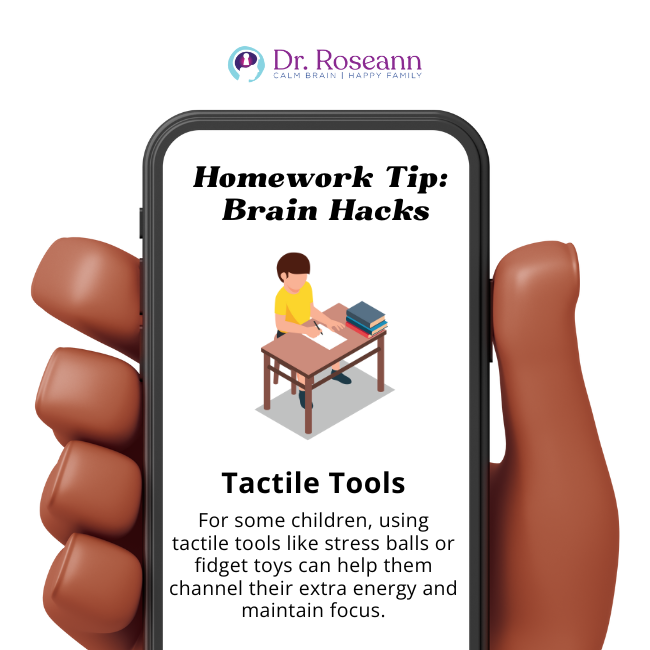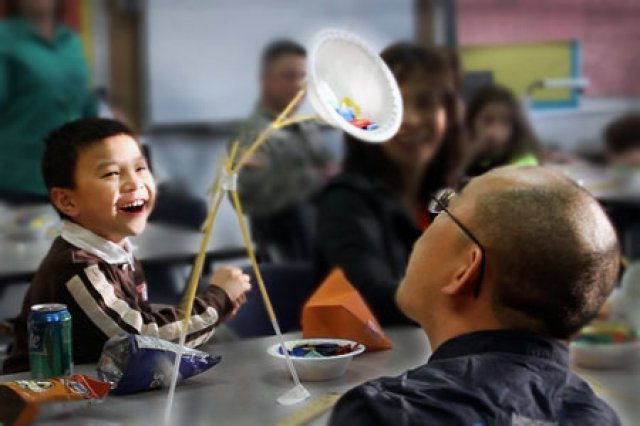- View on Facebook Page (Opens in a new tab)
- View our Twitter Page (Opens in a new tab)
- View our Instagram Page (Opens in a new tab)
- View our Youtube Page (Opens in a new tab)

An Age-By-Age Guide to Helping Kids Manage Homework

Do you ever wonder whether homework is gauging the child’s ability to complete assignments or the parent’s? On one end of the spectrum, a parent might never mention homework and assume it gets done independently; on the other end are the parents who micromanage to be sure every worksheet is absolutely perfect.
Being too laissez faire about homework might deny a child the support they need to develop executive functioning skills, but being too involved could stifle their independence. So how much parent participation in homework is actually appropriate throughout a child’s education?
Basic homework tips
According to Scholastic , you should follow these rules of thumb to support your child during homework (without going overboard):
Stay nearby and available for questions without getting right in the middle of homework.
Avoid the urge to correct mistakes unless your child asks for help.
Instead of nagging, set up a homework routine with a dedicated time and place.
Teach time management for a larger project by helping them break it into chunks.
Child psychologist Dr. Emily W. King recently wrote about rethinking homework in her newsletter. King explains at what ages kids are typically able to do homework independently, but she writes that each child’s ability to concentrate at the end of the day and use executive functioning skills for completing tasks is very individual. I talked to her for more information on how much parental involvement in homework completion is needed, according to a child’s age and grade level.
Kindergarten to second grade
Whether children even need homework this early is a hot debate. Little ones are still developing fine motor skills and their ability to sit still and pay attention at this age.
“If a child is given homework before their brain and body are able to sit and focus independently, then we are relying on the parent or other caregivers to sit with the child to help them focus,” King said. “ Think about when the child is able to sit and focus on non-academic tasks like dinner, art, or music lessons. This will help you tease out executive functioning skills from academic understanding.”
Elementary-age children need time for unstructured play and structured play like music, arts, and sports. They need outside time, free time, and quiet time, King said. For children who are not ready for independent work, nightly reading with another family member is enough “homework,” she said.
Third to fifth grades
Many children will be able to do homework independently in grades 3-5. Even then, their ability to focus and follow through may vary from day to day.
“Most children are ready for practicing independent work between third and fifth grade, but maybe not yet in the after-school hours when they are tired and want to rest or play. We need to begin exposing children to organization and structure independently in late elementary school to prepare them for more independence in middle school,” King said.
Neurodivergent kids may need more parental support for several years before they work independently.
“Neurodivergent children, many of whom have executive functioning weaknesses, are not ready to work independently in elementary school. Children without executive functioning weaknesses (e.g., the ability to remain seated and attend to a task independently) are able to do this somewhere between third and fifth grade, but it’s very possible they can work independently at school but be too tired to do it later in the afternoon,” King said. “We need to follow the child’s skills and give them practice to work independently when they seem ready. Of course, if a child wants to do extra work after school due to an interest, go for it.”
For students who are not ready to work independently in middle school, it is better to reduce the amount of homework they are expected to complete so they can practice independence and feel successful.
Middle school
In sixth grade and later, kids are really developing executive functioning skills like planning, organizing, paying attention, initiating, shifting focus, and execution. They will still need your encouragement to keep track of assignments, plan their time, and stick to a homework routine.
“Middle school students need lots of organization support and putting systems in place to help them keep track of assignments, due dates, and materials,” King said.
High school
By this point, congratulations: You can probably be pretty hands-off with homework. Remain open and available if your teen needs help negotiating a problem, but executing plans should be up to them now.
“In high school, parents are working to put themselves out of a job and begin stepping back as children take the lead on homework. Parents of high schoolers are ‘homework consultants,’” King said. “We are there to help solve problems, talk through what to say in an email to a teacher, but we are not writing the emails or talking to the teachers for our kids.”
What if homework is not working for them (or you)
There are a number of reasons a child might not be managing homework at the same level as their peers, including academic anxiety and learning disabilities.
If your child is showing emotional distress at homework time, it might be a sign that they have run out of gas from the structure, socialization, and stimulation they have already been through at school that day. One way to support kids is to teach them how to have a healthy balance of work and play time.
“When we ask students to keep working after school when their tank is on empty, we likely damage their love of learning and fill them with dread for tomorrow,” King wrote in her newsletter.
King said in her experience as a child psychologist, the amount of homework support a child needs is determined by their individual abilities and skills more than their age or grade level.
“All of these steps vary for a neurodivergent child and we are not following these guidelines by age or grade but rather by their level of skills development to become more independent,” she said. “In order to independently complete homework, a child must be able to have attended to the directions in class, brought the materials home, remember to get the materials out at home, remember to begin the task, understand the task, remain seated and attention long enough to complete the task, be able to complete the task, return the work to their backpack, and return the work to the teacher. If any of these skills are weak or the child is not able to do these independently, there will be a breakdown in the system of homework. You can see why young students and neurodivergent students would struggle with this process.”
If you and your child have trouble meeting homework expectations, talk to their teacher about what could be contributing to the problem and how to modify expectations for them.
“Get curious about your child’s skill level at that time of day,” King said. “Are they able to work independently at school but not at home? Are they not able to work independently any time of day? Are they struggling with this concept at school, too? When are they successful?”

Get Started
PARENTING HUB
40 Top Parenting Tips for Navigating Homework Challenges

Dr. Roseann Capanna-Hodge
- October 6, 2023
Navigating the intricacies of homework assignments can often feel like a maze for both parents and children alike . As someone deeply involved in child development and having worked closely with many educators, I've gathered a wealth of insights into establishing a solid homework routine.
This article is a compilation of those tried-and-tested homework tips, aimed to ease challenges and enhance productivity. Whether you're looking to foster a deeper connection with your child's teacher or seeking effective strategies to prioritize tasks, I'm here to guide you.
Homework Tips for Parents: Break the Stress and Boost Learning Hacks from a Children’s Psychologist
Homework tip: setting up the environment.
- Establish a Routine: Set a specific time and place for homework to create consistency and predictability.
- Routine Consistency: Keep the routine consistent, even on weekends, so the child knows what to expect.
- Provide a Quiet Space: Ensure your child has a quiet, well-lit, and comfortable place to work, free from distractions.
- Limit Distractions: Keep TVs, mobile phones, and other distracting electronics off during homework time.
- Limit Overall Stimuli: A clutter-free workspace can reduce distractions. Try to minimize items on their workspace that they might fidget with or get distracted by.
- Stay Organized: Use planners, calendars, or apps to keep track of assignment due dates.
- Equip the Space: Stock the homework area with essential supplies such as pencils, paper, erasers, and rulers
Homework Tip: Instruction Support
- Clear and Concise Instructions: Ensure instructions are short and to the point. Use visuals and watch for body language signals that show understanding.

- Break Tasks Into Manageable Chunks : If an assignment is extensive, break it down into smaller steps to make it more manageable.
- Chunking Information: Divide information into smaller, more digestible chunks. This can make the work seem more manageable.
- Set Time Limits: Use a timer to allocate specific amounts of time for each task, helping children stay on track.
- Timers: Use a visual timer, so they can see how much time they have left to work. This can make the passage of time more tangible.
- Teach Time Management: Help them prioritize their tasks, tackling more challenging or urgent assignments first.
- Stay Involved: Regularly check in with your child about their assignments and progress, offering guidance when needed.
- Interactive Tools: Consider using interactive educational tools or apps that can make learning more engaging for them.
- Ask Them To Explain What The Task Is: Gage what your child understands before they start the task. This will help set them in the right direction and give you a sense of what they know.
Homework Tip: Brain Hacks
- Physical Activity: Encourage short bursts of physical activity during breaks, like jumping jacks or a quick walk around the block. Physical activity can help increase attention span.
- Encourage Breaks: For longer homework sessions, ensure kids take short breaks to rest their minds and bodies.
- Offer Healthy Snacks : Brain-boosting snacks can help maintain energy and focus during study time. Fizzy drinks such as a seltzer-magnesium drink can stimulate and calm the brain.
- Shorter Work Periods: Divide homework time into shorter, more frequent sessions. For instance, instead of a continuous 30-minute session, try three 10-minute sessions with short breaks in between.
- Visual Schedules: Use visual aids like charts or diagrams to outline the tasks that need completion. This can help them understand what's expected and track their progress.
- Tactile Tools: For some children, using tactile tools like stress balls or fidget toys can help them channel their extra energy and maintain focus.

- Background Music: Some children focus better with low-volume, non-distracting background music or white noise. But others are stressed by it , so play around and do what works best for them (not you!).
- Color Coding: Use colors to categorize and prioritize tasks. This can help visually differentiate and organize their work.
- Mindfulness and Relaxation Techniques: Mindfulness techniques like deep breathing, visualization, or even short meditation sessions can help center their attention.
Homework Tip: Monitoring, Communication and Positive Reinforcement
- Stay Positive : In your own mindset. Focus on the effort and improvements, not just the end result. Praise hard work and resilience.
- Encourage Independence Over Time: While it's essential to offer support, allow kids to complete assignments on their own as they build skills before you check the work. This fosters responsibility and self-reliance.
- Be Available for Questions: Make sure your child knows they can come to you if they have questions or need clarification on a topic.
- Connect Learning to Real Life: Help your child see the real-world applications of what they're learning to make it more engaging.
- Review Completed Assignments: Go over finished homework to ensure understanding and check for errors, but avoid doing the work for them.
- Explain Consequences and Establish Rewards: Positive reinforcement can motivate your child. Consider rewards for consistent homework completion.
- Encourage a Growth Mindset: Teach your child to see challenges as opportunities for growth. Emphasize the value of persistence and learning from mistakes. Talk to kids about how regular practice builds skills even when the learning is hard!
- Positive Reinforcement: Reinforce positive behavior immediately. If they've focused well for a short span, reward that effort to encourage repetition of the desired behavior.
- Active Participation: Encourage them to engage actively with their work, such as reading aloud or teaching the content back to you. This can reinforce their understanding and attention.
- Regular Check-ins: Check in more frequently during their homework sessions, offering guidance, encouraging movement to support brain alertness.
- Immediate Feedback: Give immediate feedback on their work. This keeps them engaged and lets them know they're on the right track.
- Open Communication: Ensure your child feels comfortable discussing their challenges with you. Sometimes, they might have insights into what might help them focus better.
Long Game Parent Homework Tips
- Stay Informed: If your child has a diagnosed attention disorder, like ADHD, stay updated with the latest strategies and recommendations specific to their needs. You can join our CALM Brain Parenting Community for science-backed solutions to support attention and learning.
- Stay in Touch with Teachers: Regular communication with educators can give insights into how your child is doing and where they might need additional help. They may benefit from school accommodations or more formal IEP support .
- Seek External Support: If focus issues persist, consider seeking help from a tutor, educational therapist, or counselor familiar with attention challenges.
Reflecting on these pivotal parent homework tips, it becomes evident that with the right strategies, we can turn potential struggles into stepping stones for success. By instilling a consistent homework routine and maintaining open communication with your child, we're setting the stage for academic achievements.
Each child is a unique individual, and it's crucial to discover what resonates best with them during homework time. It is also important to look for root causes better and better understand why your child is struggling .
With these tools at your disposal, I'm confident in your ability to lead your child through the myriad tasks and challenges that lie ahead. Together, let's make every homework session a journey of growth and discovery and tamp down frustration!
Always remember… “Calm Brain, Happy Family™”
Disclaimer: This article is not intended to give health advice and it is recommended to consult with a physician before beginning any new wellness regime. *The effectiveness of diagnosis and treatment vary by patient and condition. Dr. Roseann Capanna-Hodge, LLC does not guarantee certain results.
Are you looking for SOLUTIONS for your struggling child or teen?
Dr. Roseann and her team are all about science-backed solutions, so you are in the right place!
Grab your complimentary copy of 147 Therapist-Endorsed Self-Regulation Strategies for Children: A Practical Guide for Parents
You can get her books for parents and professionals, including: It’s Gonna Be OK™: Proven Ways to Improve Your Child’s Mental Health , Teletherapy Toolkit™ and Brain Under Attack: A Resource For Parents and Caregivers of Children With PANS, PANDAS, and Autoimmune Encephalopathy.
If you are a business or organization that needs proactive guidance to support employee mental health or an organization looking for a brand representative, check out Dr. Roseann’s professional speaking page to see how we can work together.
Dr. Roseann is a Children’s Mental Health Expert and Therapist who has been featured in/on hundreds of media outlets including, CBS, NBC, FOX News, PIX11 NYC, The New York Times, The Washington Post, Business Insider, USA Today, CNET, Marth Stewart, and PARENTS. FORBES called her, “A thought leader in children’s mental health.”
She is the founder and director of The Global Institute of Children’s Mental Health and Dr. Roseann Capanna-Hodge, LLC. Dr. Roseann is a Board Certified Neurofeedback (BCN) Practitioner, a Board Member of the Northeast Region Biofeedback Society (NRBS), Certified Integrative Mental Health Professional (CIMHP) and an Amen Clinic Certified Brain Health Coach. She is also a member of The International Lyme Disease and Associated Disease Society (ILADS), The American Psychological Association (APA), Anxiety and Depression Association of America (ADAA) National Association of School Psychologists (NASP), International OCD Foundation (IOCDF) International Society for Neurofeedback and Research (ISNR) and The Association of Applied Psychophysiology and Biofeedback (AAPB).
© Roseann-Capanna-Hodge, LLC 2023
Recent Posts

Parent Guide: ADHD Paralysis vs. Executive Dysfunction

AuDHD Test For Children and Teens

What are the 12 Executive Functioning Skills?

100 Ways to Reduce Stress for Children with ADHD and Autism

Breaking Down Task Initiation: ADHD Strategies in 11 Steps

- Neurofeedback / Biofeedback
- Neurofeedback FAQ
- Terms & Conditions
- Privacy Policy
The effectiveness of diagnosis and treatment vary by patient and condition. Dr. Roseann Capanna-Hodge, LLC does not guarantee certain results.
Having Computer issues?
about your child’s behavior that keeps you up at night?
By sending us your question, you give us permission to use your audio clip anonymously in our podcast.
Welcome, Login to your account.
Recover your password.
A password will be e-mailed to you.
- 6 Tips For Raising a Child Alone as a Single Parent
- Sex, Love & Feelings: How Do Guys Get Emotionally Attached?
- How Do You Define Family? The True Meaning (& Some Definitions) of Family
- Step-Parents: 17 Tips to Balance Your Family and Your Relationship
- Having a Fun Time with Early-Teen Grandchildren (Ages 12-15)
- What’s Wrong With “Mommy Juice” & “Wine-O-Clock” Culture?
- What Are The Positive Effects of Helicopter Parenting?
- Soap for Swearing: Is it Acceptable Today?
- Here’s What You Can Do When Your Partner Doesn’t Want To Have Children
- Step Parent Problems: Advice on Boundaries

Your Age-by-Age Guide to Homework
Are you scared to look in your child’s book bag at the end of the day?
And I’m not talking about the forgotten sandwiches that migrate to the bottom of a full backpack.
I mean the dreaded homework assignments that loom within folders and binders, just waiting to be ignored and fought over for the rest of the evening.
Typically when parents think of the word “homework”, they quickly associate it with the term “fight”.
But homework doesn’t have to be a fight – a struggle at times, yes, but now a full out war.
Understanding what homework looks like at each grade level is a great start to helping support your child in completing their school work.
Also, the earlier you focus on creating an environment of learning and studying, the easier time your child will have as they progress through school.
Here’s your guide on setting up your child for academic success as well as what kind of homework to expect for each grade:
Setting Up For Success
From day one, homework is important in developing good study skills.
In order to encourage your child to complete their homework and take it seriously, you need to establish a proper homework environment .
Here are some tips for setting your child up for homework success:
- Set a regular homework time. Homework should be done at the same time each evening to establish a routine. Just make sure you’re allowing your little one some time to decompress when they get home before jumping into more schoolwork.
- Create a study area. Give your child a place to with proper lighting, materials and few to now distractions.
- Keep an eye on their work. Involve yourself in the process not only by helping them with homework, but monitoring their progress as well.
- Be a role model. While you may not have homework at this stage in your life, you can model good study habits by reading and pursuing your own learning opportunities.
You may think your child is a little Einstein when they start school, but the learning material will progressively get more difficult as they age.
Encouraging good study habits will give them the skills they need to continue their success through school.
Grade-by-Grade Homework Guide
Kindergarten.

When your little one is in kindergarten, it’s likely they won’t have much for homework.
However, you may find the teacher sending home easy tasks such as practicing sight words, letters, numbers and working on patterns.
Since there shouldn’t be a lot of academic expectation from children this young, it’s easy to navigate the homework by making it fun and play-based.
Children learn best through tactile activities, so materials such as PlayDoh can be used to create numbers and letters as well as designing patterns using different colors.
A whiteboard is a great tool to practice what they are learning, especially sight words. Write out the word, have your child read it and let them erase it before moving on to the next one.
Kindergarten homework tends to be pretty repetitive, meaning that your child is likely going to practice the same material each night on a week-to-week basis.
Even if your little one is catching on quick to the material, it’s important to keep up with the homework habit. This is going to help them develop healthy studying habits as they move from grade to grade.
Elementary School: Grades 1 to 2

Once your child moves from kindergarten into grade 1, the learning environment becomes less play-based and more academic.
This doesn’t mean you can’t continue making homework fun! At this age, their focus is still on playing, so you can keep using novel materials when doing homework.
The workload is likely not going to increase during these grades, but the material may become more challenging.
In order to keep homework from becoming too time consuming, you may have to mix straight-up review with play.
Use unique activities when it comes to concepts your child is struggling with and quick reviews for the learning objectives they have easily grasped.
By these grades, teachers typically encourage your child to be reading. This aspect of homework can be delayed until bedtime – which makes reading seem less like “work” and more like a leisurely activity.
Elementary School: Grades 3 to 5

By the time your little one enters grade 3, and until they finish elementary school, they should begin to complete their homework independently.
While it’s important that you remain on standby to help them with difficult concepts, you should be able to set up each homework activity and allow them to complete them on their own.
During this time, students begin to progress from simply practicing basic skills and mastering them onto more complex skills.
This means that homework is going to become more challenging, which is why focusing on a good homework routine during these grades is very important.
If you find your child resisting their homework at this age, there’s nothing wrong with offering an incentive for completing it. Try to stay away from monetary rewards and focus more on fun activities they can engage in once homework is completed.
Remember to not make homework seem like a cumbersome chore – instead, cheer your child on as they work through it. Praise them for doing a good job.
Middle School: Grades 6 to 8

Once your child hits middle school, they should be able to complete their homework assignments on their own.
Homework at this grade level is going to shift more heavily from practicing concepts to completing assignments such as essays and projects.
This is the beginning stages of the foundation of study skills they will need to succeed in high school as well as college or university.
During this time, students are beginning to rely more on technology to complete their assignments. Make sure your child has access to a tablet or computer they can use to conduct research as well as seek help for their homework.
However, it’s important for you to stay involved in their progress. Regular check-ins with their homework will not only help your child stay on track but it will also show them that you want to be involved in their education.
High School: Grades 9 to 12

It’s in high school where a student’s homework load balloons and becomes more time consuming than it was before.
Luckily, kids at these grade levels are able to choose a portion of their courses, so they have a vested interest in what they are learning.
However, with all the changes they are experiencing emotionally and physically, this period of their lives can be extremely stressful.
Maintaining that homework routine is more important now than ever. Stressed-out teens may become overwhelmed with the workload and feel compelled on throwing in the towel on completing homework assignments.
Continue to be supportive by helping them plan and prepare for homework assignments as well as tests and exams .
While you may not be able to help them with the homework material (what is “new” math, anyway?), you can certainly lend a hand when it comes to time management and getting the homework done.
You Can Make the Difference
When left to their own devices, children can’t be expected to take their schoolwork 100% seriously.
It’s your job as the parent to support and guide them through their homework and assignments.
Building good habits now is going to make all the differences as your child progresses through school.
How do you deal with homework hurdles? Share your tips in the comments!
My name is Chelsy and I am a single mother, blogger, and freelance writer. I blog about parenting at Motherhood+Mayhem (motherhoodandmayhem.online) and about working from home at Mama Needs Coffee (mamaneedscoffee.online). When I'm not writing or blogging, you can find me building blanket forts in my living room.
Your email address will not be published.
Save my name, email, and website in this browser for the next time I comment.
7 Easy Ways to Help Your Kids To Finish Their Homework…
404 Not Found
- Subscribers
Home / Expert Articles / Child Behavior Problems / School & Homework
The Homework Battle: How to Get Children to Do Homework
By debbie pincus, ms lmhc.

Parents often feel it’s their job to get their kids to do well in school. Naturally, you might get anxious about this responsibility as a parent. You might also get nervous about your kids succeeding in life—and homework often becomes the focus of that concern.
But when parents feel it’s their responsibility to get their kids to achieve, they now need something from their children—they need them to do their homework and be a success. I believe this need puts you in a powerless position as a parent because your child doesn’t have to give you what you want.
The battle about homework becomes a battle over control. Your child starts fighting to have more control over the choices in their life, while you feel that your job as a parent is to be in control of things. So you both fight harder, and it turns into a war in your home.
Over the years, I’ve talked to many parents who are in the trenches with their kids, and I’ve seen firsthand that there are many creative ways kids rebel when it comes to schoolwork. Your child might forget to do their homework, do their homework but not hand it in, do it sloppily or carelessly, or not study properly for their test. These are just a few ways that kids try to hold onto the little control they have.
When this starts happening, parents feel more and more out of control, so they punish, nag, threaten, and argue. Some parents stop trying altogether to get their children to do homework. Or, and this is common, parents will over-function for their kids by doing the work for them.
Now the battle is in full swing: reactivity is heightened as anxiety is elevated—and homework gets lost in the shuffle. The hard truth for parents is that you cannot make your children do anything, let alone homework. But what you can do is to set limits, respect their individual choices, and help motivate them to motivate themselves.
You might be thinking to yourself, “You don’t know my child. I can’t motivate him to do anything.” Many parents tell me that their children are not motivated to do their work. I believe that children are motivated—they just may not be motivated the way you’d like them to be. Keep reading for some concrete tips to help you guide them in their work without having to nag, threaten, or fight with them.

Also, keep in mind that if you carry more of the worry, fear, disappointments, and concern than your child does about their work, ask yourself, “What’s wrong with this picture, and how did this happen?” Remember, as long as you carry their concerns, they don’t have to.
Stop the Nightly Fights
The way you can stop fighting with your kids over homework every night is to stop fighting with them tonight. Disengage from the dance. Choose some different steps or decide not to dance at all. Let homework stay where it belongs—between the teacher and the student. Stay focused on your job, which is to help your child do their job. Don’t do it for them.
If you feel frustrated, take a break from helping your child with homework. Your blood pressure on the rise is a no-win for everyone. Take five or ten minutes to calm down, and let your child do the same if you feel a storm brewing.
Create Structure Around Homework Time
Set limits around homework time. Here are a few possibilities that I’ve found to be effective with families:
- Homework is done at the same time each night.
- Homework is done in a public area of your house.
- If grades are failing or falling, take away screen time so your child can focus and have more time to concentrate on their work.
- Make it the rule that weekend activities don’t happen until work is completed. Homework comes first. As James Lehman says, “The weekend doesn’t begin until homework is done.”
Let Your Child Make Their Own Choices
I recommend that your child be free to make their own choices within the parameters you set around schoolwork. You need to back off a bit as a parent. Otherwise, you won’t be helping them with their responsibilities.
If you take too much control over the situation, it will backfire on you by turning into a power struggle. And believe me, you don’t want a power struggle over homework. I’ve seen many kids purposely do poorly just to show their parents who’s in charge. I’ve also seen children who complied to ease their parents’ anxiety, but these same kids never learned to think and make choices for themselves.
Let Your Child Own the Consequences of Their Choices
I’m a big believer in natural consequences when it comes to schoolwork. Within the structure you set up, your child has some choices. They can choose to do their homework or not. And they can choose to do it well and with effort or not. The natural consequences will come from their choices—if they don’t choose to do their work, their grades will drop.
When that happens, you can ask them some honest questions:
“Are you satisfied with how things are going?”
“What do you want to do about your grade situation?”
“How can I be helpful to you?”
Be careful not to be snarky or judgmental. Just ask the question honestly. Show honest concern and try not to show disappointment.
Intervene Without Taking Control
The expectation is that homework is done to the best of your child’s ability. When they stop making an effort, and you see their grades drop, that’s when you invite yourself in. You can say:
“It’s my job to help you do your job better. I’m going to help you set up a plan to help yourself, and I will check in to make sure you’re following it.”
Set up a plan with your child’s input to get them back on their feet. For example, the new rules might be that homework must be done in a public place in your home until they get their grades back up. You and your child might meet with the teacher to discuss disciplinary actions should their grades continue to drop.
In other words, you will help your child get back on track by putting a concrete plan in place. And when you see this change, you can step back out of it. But before that, your child is going to sit in a public space and you’re going to monitor their work.
You’re also checking in more. Depending on your child’s age, you’re making sure that things are checked off before they go out. You’re adding a half-hour of review time for their subjects every day. And then, each day after school, they’re checking with their teacher or going for some extra help.
Remember, this plan is not a punishment—it’s a practical way of helping your child to do their best.
“I Don’t Care about Bad Grades!”
Many parents will say that their kids just don’t care about their grades. My guess is that somewhere inside, they do care. “I don’t care” also becomes part of a power struggle.
In other words, your child is saying, “I’m not going to care because you can’t make me. You don’t own my life.” And they’re right. The truth is, you can’t make them care. Instead, focus on what helps their behavior improve. And focus more on their actions and less on their attitude because it’s the actions that matter the most.
Motivation Comes From Ownership
It’s important to understand that caring and motivation come from ownership. You can help your child be motivated by allowing them to own their life more.
So let them own their disappointment over their grades. Don’t feel it more than they do. Let them choose what they will do or not do about their homework and face the consequences of those choices. Now they will begin to feel ownership, which may lead to caring.
Let them figure out what motivates them, not have them motivated by fear of you. Help guide them, but don’t prevent them from feeling the real-life consequences of bad choices. Think of it this way: it’s better for your child to learn from those consequences at age ten by failing their grade and having to go to summer school than for them to learn at age 25 by losing their job.
When Your Child Has a Learning Disability
I want to note that it’s very important that you check to see that there are no other learning issues around your child’s refusal to do homework. If they’re having difficulty doing the work or are performing below grade-level expectations, they should be tested to rule out any learning disabilities or other concerns.
If there is a learning disability, your child may need more help. For example, some kids need a little more guidance; you may need to sit near your child and help a little more. You can still put structures into place depending on who your child is.

But be careful. Many times, kids with learning disabilities get way too much help and develop what psychologists call learned helplessness . Be sure you’re not over-functioning for your learning disabled child by doing their work for them or filling in answers when they’re capable of thinking through them themselves.
The Difference Between Guidance and Over-Functioning
Your child needs guidance from you, but understand that guidance does not mean doing their spelling homework for them. Rather, it’s helping them review their words. When you cross the line into over-functioning, you take on your child’s work and put their responsibilities on your shoulders. So you want to guide them by helping them edit their book report themselves or helping them take the time to review before a test. Those can be good ways of guiding your child, but anything more than that is taking too much ownership of their work.
If your child asks for help, you can coach them. Suggest that they speak with their teacher on how to be a good student and teach them those communication skills. In other words, show them how to help themselves. So you should not back off altogether—it’s that middle ground that you’re looking for. That’s why I think it’s essential to set up a structure. And within that structure, you expect your child to do what they have to do to be a good student.
Focus on Your Own Goals
When you start over-focusing on your child’s work, pause and think about your own goals and what do you need to get done to achieve those goals. Model your own persistence and perseverance to your child.
Believe In Your Child
I also tell parents to start believing in their children. Don’t keep looking at your child as a fragile creature who can’t do the work. I think we often come to the table with fear and doubt—we think if we don’t help our kids, they’re just not going to do it.
But as much as you say, “I’m just trying to help you,” what your child hears is, “You’re a failure; I don’t believe you can do it on your own.”
Instead, your message should be, “I know you can do it. And I believe in you enough to let you make your own choices and deal with the consequences.”
Related content: What Can I Do When My Child Refuses to Go to School? “My Child Refuses to Do Homework” — How to Stop the Nightly Struggle Over Schoolwork
For more information on the concept of learned helplessness in psychology and behavior, we recommend the following articles:
Psychology Today: Learned Helplessness
VeryWell Mind: What Is Learned Helplessness and Why Does it Happen?
About Debbie Pincus, MS LMHC
For more than 25 years, Debbie has offered compassionate and effective therapy and coaching, helping individuals, couples and parents to heal themselves and their relationships. Debbie is the creator of the Calm Parent AM & PM™ program and is also the author of numerous books for young people on interpersonal relations.
You must log in to leave a comment. Don't have an account? Create one for free!
Frank My daughter Nina just turned 8 (Feb 11). She does not like to do homework one bit. Her teacher gives her homework every day except Friday. She loves Fridays because she doesn't like homework. She always hides her homework under her bed, refuses to do her homework, and in the More morning she tells her teacher "I lost it last night and can't find it!". She feels homework is a waste of time, yes, we all feel that way, but poor Nina needs to learn that homework is important to help you stay smart. She needs to start doing homework. How can I make her 2nd-grade brain know that homework is actually good? Is there a way to make her love, love, LOVE homework? Let me know.
Rebecca Wolfenden, Parent Coach We appreciate you writing in to Empowering Parents and sharing your story. Because we are a website aimed at helping people become more effective parents, we are limited in the advice and suggestions we can give to those outside of a direct parenting role. In addition to the tips in More the article above, it may be helpful to look into local resources to help you develop a plan for addressing these particular issues with your cousins, such as their doctor or their teachers. We wish you the best going forward. Take care.
Rebecca Wolfenden, Parent Coach I hear you. Homework can be a challenging, frustrating time in many families even under the best of circumstances, so you are not alone. When kids struggle with a subject, it can be even more difficult to get assignments completed. Although you didn’t indicate that your daughter More has ADHD, you might find some helpful tips in Why School is Hard for Kids with ADHD—and How You Can Help . Author Anna Stewart outlines techniques that can be useful to help make homework more interesting for kids with a variety of learning challenges in this article. You might also consider checking in with your daughter’s teacher, as s/he might have some additional ideas for engaging your daughter in her homework. Please be sure to write back and let us know how things are going for you and your family. Take care.
So, after reading this I get to say…GREAT…You really do not know my child. We have done 100% of everything listed in this article. In the end, my son has utterly declared “I DON’T CARE, AND I DON’T NEED SCHOOL”. We have attempted a “reward” system as well, and that doesn’t work. He cares about 3 or 4 things. Nintendo DS, Lego, K’Nex, TV…all of those he has lost over the past year. Now he reads, ALL the time. Fine, but that doesn’t get his homework done. It also doesn’t get anything else he needs to do done. We’ve done “task boards”, we’ve done “Reward Systems”, we’ve done the “What is on your list to complete”. EVERYTHING is met with either a full fledged meltdown (think 2 year old…on the floor, kicking and screaming and crying). His IMMEDIATE response to ANYTHING that may interrupt him is “NO” or worse. If something doesn’t go his way directly he throws a fit INSTANTLY, even if the response is “Give me a second” it’s NOW OR I’M DESTROYING SOMETHING. He’s been suspended multiple times for his anger issues, and he’s only 10. Unfortuantely we have no family history as he was adopted from Russia. His “formal” diagnosis are ADHD and Anxiety. I’m thinking there is something much more going on. BTW: He did have an IQ test and that put him at 145 for Spacial and Geometric items, with a 136 for written and language. His composite was 139, which puts him in the genius category, but he’s failing across the board…because he refuses to do the work.
Interesting article and comments. Our son (6th grade) was early diagnosed as ADHD and for the first 3 years of elementary school several of his teachers suggested he might require special education. But then the school counseling staff did a workup and determined that his IQ is 161 and from that point forward his classroom antics were largely tolerated as “eccentric”. He has now moved to middle school (6th grade) and while his classroom participation seems to be satisfactory to all teachers, he has refused to do approximately 65% of his homework so far this school year. We have tried talking with him, reasoning with him, removing screen time, offering cash payments (which he lectures us as being unethical “bribes”), offering trips, offering hobbies and sporting events, and just about anything we can think of. Our other children have all been through the “talented and gifted” programs, but he simply refuses to participate in day-to-day school work. His fall report card was pretty much solid “F” or “O” grades. He may be bored out of his mind, or he may have some other issues. Unfortunately, home schooling is not an option, and neither is one of the $40,000 per year local private schools which may or may not be in a better position to deal with his approach to school. Do “learning centers” work for kids like this? Paying somebody else to force him to do his homework seems like a coward’s solution but I am nearly at the end of my rope! Thanks..
RebeccaW_ParentalSupport 12yokosuka Many parents struggle with staying calm when their child is acting out and screaming, so you are not alone. It tends to be effective to set up a structured time for kids to do their homework and study, and they can earn a privilege if they comply and meet More their responsibilities. What this might look like for your daughter is that if she studies, she can earn her phone that day. If she refuses, and chooses to argue or scream at you instead, then she doesn’t earn her phone that day and has another chance the next day. You can read more about this in https://www.empoweringparents.com/article/end-the-nightly-homework-struggle-5-homework-strategies-that-work-for-kids/. If you are also looking for resources to help you stay calm, I encourage you to check out our articles, blogs, and other resources on https://www.empoweringparents.com/article-categories/parenting-strategies-techniques/calm-parenting/. Please let us know if you have any additional questions. Take care.
Scott carcione
I’m sorry to hear about the challenges you are experiencing with your
son.I also hear the different
approaches you and your ex are taking toward parenting your son.While it would be ideal if you were able to
find common ground, and present a consistent, united response to your son’s
choices, in the end, you can only https://www.empoweringparents.com/article/parenting-after-divorce-9-ways-to-parent-on-your-own-terms/.At
this point, it might be useful to meet with the school to discuss how you can
work together to hold your son accountable for his actions, such as receiving a
poor grade if he refuses to do his work.Janet Lehman discusses this more in https://www.empoweringparents.com/article/when-your-child-has-problems-at-school-6-tips-for-parents/.Take care.
It can be so challenging when your child is acting out at school, yet does
not act that way at home.One strategy I
recommend is talking with your son at home about his behavior at school.During this conversation, I encourage you to
address his choices, and come up with a specific plan for what he can do differently
to follow the rules.I also recommend
working with his teachers, and discussing how you can assist them in helping
your son to follow the rules.You might
find additional useful tips in our article, https://www.empoweringparents.com/article/acting-out-in-school-when-your-child-is-the-class-troublemaker/.Please be sure to write back and let us know
how things are going for you and your son.Take care.
I hear you.It can be so challenging
when your young child is having outbursts like this.A lot of young children tend to act out and
have tantrums when they are experiencing a big transition, such as starting a
new school or adjusting to having a younger sibling, so you are not alone.Something that can be helpful is to set up
clear structure and expectations around homework, as Janet Lehman points out in
https://www.empoweringparents.com/article/my-child-refuses-to-do-homework-heres-how-to-stop-the-struggle/.I also encourage you to set aside some time
for you to have https://www.empoweringparents.com/article/attention-seeking-behavior-in-young-children-dos-and-donts-for-parents/ with your daughter as well.Please be sure to write back and let us know
how things are going for you and your family.Take care.
JoJoSuma I am having the exact same problem with my 9 year old son. His grades are quickly falling and I have no idea why or where to begin with helping him turn things around. When he applies himself he receives score of 80% or higher, and when he doesn't it clearly shows and he receives failing scores. He, too, says that he doesn't do or want to do the work because it is boring, or that he "Forgot" or "lost it". He has started to become a disruption to the class and at this rate I am afraid that he will have to repeat 5th grade. I am also a single parent so my frustration is at an all time high. You are not alone and I wish you and your family the best.
Thank you so much for these tips RebeccaW_ParentalSupport because I SERIOUSLY had nowhere to turn and no clue where to begin. I have cried many nights feeling like I was losing control. I will try your tips and see where things go from here.
It’s not uncommon
for kids to avoid doing homework, chores or other similar tasks. After
all, homework can be boring or difficult, and most people (both kids and adults
alike) tend to prefer activities which are enjoyable or fun. This does
not mean that you cannot address this with your daughter, though.
Something which can be helpful for many families is to set up a structured
homework time, and to require that your daughter complete her homework in order
to earn a privilege later on that evening. You can read about this, and
other tips, in https://www.empoweringparents.com/article/end-the-nightly-homework-struggle-5-homework-strategies-that-work-for-kids/.
Please be sure to write back and let us know how things are going for you and
your daughter. Take care.
Thestruggleisreal I'm just now signing up for these articles, I'm struggling with my 12 year and school work, she just doesn't want to do it, she has no care I'm world to do, she is driving me crazy over not doing, I hate to see her More fail, but I don't know what to do
FamilyMan888
I can hear how much your
daughter’s education means to you, and the additional difficulties you are
facing as a result of her learning disabilities. You make a great point
that you cannot force her to do her work, or get additional help, and I also
understand your concern that getting her teachers to “make” her do these things
at school might create more conflict there as well. As James Lehman
points out in his article, https://www.empoweringparents.com/article/stop-the-blame-game-how-to-teach-your-child-to-stop-making-excuses-and-start-taking-responsibility/, lowering your expectations for your daughter due to her
diagnosis is probably not going to be effective either. Instead, what you
might try is involving her in the https://www.empoweringparents.com/article/the-surprising-reason-for-bad-child-behavior-i-cant-solve-problems/, and asking her what she thinks she needs, and what she will do
differently, to meet classroom expectations. Please be sure to write back
and let us know how things are going for you and your family. Take care.
tvllpit Very effective to kids age of 5, 7, and 11 years old. Thank you for sharing your idea.
Thank you for
your question. You are correct that we recommend setting up a structured
time for kids to do homework, yet not getting into a power struggle with them
if they refuse to do their work during that time. It could be useful to
talk with your 11 year old about what makes it difficult to follow through with
doing homework at that time, and perhaps experimenting with doing homework at
another time to see if that works more effectively. In the end, though,
if your child is simply refusing to do the work, then we recommend giving a
consequence and avoiding a power struggle. Megan Devine details this
process more in her article, https://www.empoweringparents.com/article/end-the-nightly-homework-struggle-5-homework-strategies-that-work-for-kids/.
Please let us know if you have any additional questions. Take care.
jovi916 I'm a mother to a 10 year old 5th grader. Since 3rd grade I've been struggling with homework. That first year, I thought it was just lack of consistency since my children go between mine and dad's house. I tried setting some sort of system up with More the teacher to get back on track, but the teacher said it was the child's responsibility to get the hw done. This year has been esp. Difficult. He stopped doing hw, got an F, so I got on him. He stared turning half done work, but same grades so I still got on him. Grades went up, I loosened up, then he stopped with in school work. Now it's back to not turning anything in, even big projects and presentations. He had never really been allowed to watch tv, but now it's a definite no, I took his Legos away, took him out of sports. Nothing is working. He's basically sitting at the table every night, and all weekend long in order to get caught up with missing assignments. I'm worried, and next year he'll be in middle school. I try setting an example by studying in front of him. My daughter just does her homework and gets good grades. Idk what to do.
I can hear your concern. Academic achievement is important
to most parents and when your children seem to be struggling to complete their
work and get good grades, it can be distressing. Ultimately, your childrens’
school work and grades are their responsibility. You shouldn’t have to quit
your own studies in order to help them improve theirs. The above article gives
some great tips for helping motivate your children to complete their homework.
We do have a couple other articles you may also find useful: https://www.empoweringparents.com/article/10-ways-to-motivate-your-child-to-do-better-in-school/ & https://www.empoweringparents.com/article/sinking-fast-at-school-how-to-help-your-child-stay-afloat/. We appreciate you
writing in and hope you find the information useful. Take care.
RNM I have the exact same issues with my 8 year old. It makes me feel like I'm doing something wrong. He's a smart kid, he just doesn't seem to care to do his homework let alone if he gets a bad grade as a result. He hates reading, but does More very well in spelling and science. Homework is an issue nightly and the teacher pulled me aside today to tell me again how much he talks in class and that now he isn't writing down his assignments and is missing 3 assignments this week. SMH, I don't know what to do anymore other than to coach him (some more) and take away basketball if he doesn't do his homework.
What? "Let homework stay where it belongs—between the teacher and the student. Refuse to get pulled in by the school.." I do not see the logic or benefit of this advice. Homework, by definition, is the responsibility of the student and parent (NOT the teacher). The teacher does not live at the student's home or run the house.
In my opinion, the lack of parental involvement with academics often causes the low student performance evident across the U.S. I do not agree with advocating for even LESS parental involvement.
I completely agree with you. Parental, or adult, engagement at home can be a deal-maker/breaker when it comes to student performance. I subscribe to theories that differ from the author's.
First, if an adult is involved with the child and his activities, then the child will commonly react with "hey, somebody cares about me" leading to an increased sense of self-worth. A sense of caring about one's-self leads to caring about grades and other socially acceptable behaviors (Maslow).
Secondly, I am a FIRM believer in the techniques of behavior modification through positive reinforcement (Karen Pryor). It's up to an invested adult to determine what motivates the student and use those motivators to shape and reinforce desirable behavior such as daily homework completion. A classroom teacher has too many students and too little time to apply this theory.
Letting a child sink or swim by himself is a bad idea. Children have only one childhood; there are no do-overs.
And yes, children are work.
Many experience similar feelings of being at fault when
their child fails, so, you’re not alone. Truth of the matter is, allowing your
child to experience natural consequences of their actions by allowing them to
fail gives them the opportunity to look at themselves and change their
behavior. We have a couple articles I think you may find helpful: When You Should Let Your Child Fail: The Benefits of Natural Consequences & 5 Natural Consequences You Should Let Your Child Face . Good luck to you and
your family moving forward. Take care.
hao hao It is so true, we can't control our children's home. It is their responsibility. But they don't care it. What can we do it?
indusreepradeep
How great it is that you want to help your brother be more
productive with his homework. He’s lucky to have a sibling who cares about him
and wants him to be successful. Because we are a website aimed at helping
parents develop better ways of managing acting out behavior, we are limited in
the advice we can offer you as his sibling. There is a website that may be able
to offer you some suggestions. http://www.yourlifeyourvoice.org/
is a website aimed at helping teens and young adults figure out ways of dealing
with challenges they may be facing in their lives. They offer several ways of
getting support, such as by e-mail or text, through an online forum and chat,
and also a call in helpline. You can check out what they have to offer at http://www.yourlifeyourvoice.org/. Good luck
to you and your family moving forward. Take care.
Kathleenann indusreepradeep
Thank you so much for your humble support....
It sounds like you have done a lot
of work to try to help your daughter achieve her educational goals, and it’s
normal to feel frustrated when she does not seem to be putting in the same
amount of effort. It can be useful to keep your focus on whether your
daughter is doing her work, and to keep that separate from whether she “cares”
about doing her work. Ultimately, it is up to your daughter to do her
work, regardless of how she appears to feel about it. To that end, we
recommend working with the various local supports you have in place, such as
her therapists and others on her IEP team, to talk about what could be useful
to motivate your daughter to do her school work. Because individuals with
autism can vary greatly with their abilities, it’s going to be more effective
to work closely with the professionals who are familiar with your daughter’s
strengths and level of functioning in order to develop a plan to address this
issue. Thank you so much for writing in; we wish you and your daughter
all the best as you continue to address her difficulties with school.
is there a blog for parents that went to Therapeutic boarding schooling for their adolescent?
Responses to questions posted on EmpoweringParents.com are not intended to replace qualified medical or mental health assessments. We cannot diagnose disorders or offer recommendations on which treatment plan is best for your family. Please seek the support of local resources as needed. If you need immediate assistance, or if you and your family are in crisis, please contact a qualified mental health provider in your area, or contact your statewide crisis hotline.
We value your opinions and encourage you to add your comments to this discussion. We ask that you refrain from discussing topics of a political or religious nature. Unfortunately, it's not possible for us to respond to every question posted on our website.
- 1. What to Do When Your Child or Teen is Suspended or Expelled From School
- 2. "My Child Refuses to Do Homework" — How to Stop the Nightly Struggle Over Schoolwork
- 3. Acting Out in School: When Your Child is the Class Troublemaker
- 4. Young Kids in School: Help for the Top 4 Behavior Problems
- 5. When Your Child Has Problems at School: 6 Tips for Parents
- 140,000+ Subscribers Subscribe
- 50,000+ Fans Follow
- 10,000+ Followers Follow
- 6,000+ Followers Follow
Disrespect... defiance... backtalk... lack of motivation...
Frustrated and exhausted by your child's behavior?
Get your FREE Personal Parenting Plan today.
Does your child exhibit angry outbursts , such as tantrums, lashing out, punching walls, and throwing things?
Would you like to learn about how to use consequences more effectively?
Backtalk... complaints... arguments... attitude... just plain ignoring you
Do you struggle with disrespect or verbal abuse from your child?
Has your child been diagnosed with oppositional defiant disorder (ODD)?
Or does your child exhibit a consistent and severe pattern of anger, irritability, arguing, defiance, and vindictiveness toward you or other authority figures?
Intimidation... aggression... physical abuse and violence ...
Are you concerned that your child may physically hurt you or others?
You must select at least one category to create your Personal Parenting Plan:
We're just about finished! Create a secure account with Empowering Parents to access your Personal Parenting Plan.
- Skip to main content
- Skip to primary sidebar
- Skip to footer
Additional menu
Khan Academy Blog
Making Homework Easier: Tips and Tools for Parents
posted on September 20, 2023
By Stephanie Yamkovenko , group manager of Khan Academy’s Digital Marketing Team.

Homework can present challenges for parents and children alike. You naturally want to provide support for your child’s learning journey and ensure they are reaching their full potential. In this blog post, we will delve into practical strategies to assist your child with their homework. From fostering understanding and offering encouragement to breaking down tasks and implementing rewards, we will explore a variety of effective approaches to help your child achieve academic success.
Step 1: Set Up Your Child for Success
Your child’s study environment can have a significant impact on their homework performance. Create a space that is free from distractions like the television, smartphones, or noisy siblings. The study space should be comfortable, well lit, and have all the necessary materials your child might need, such as pens, papers, and textbooks. If your child’s workspace is noisy or uncomfortable, they may have difficulty focusing on their homework, resulting in lower productivity.
For example, if you live in a small apartment, consider setting up a designated corner with a small desk or table where your child can focus on their work. You can use dividers or screens to create a sense of privacy and minimize distractions.
If the only place to do homework is in the dining room or kitchen, try to establish a routine where the area is cleared and organized before study time. This can help signal to your child that it’s time to concentrate and be productive.
Remember, it’s important to adapt to your specific circumstances and make the best of the available space. The key is to create a dedicated study area that promotes focus and minimizes interruptions regardless of the size or location of your home.
Try Confidence Boosters for Your Child Here!
Step 2: make it fun.
It’s important to make homework fun and engaging for your child. Here are some examples of how you can do it:
- Use games : Incorporate educational games like card games, board games, or puzzles that align with the subject your child is learning. For instance, use Scrabble to practice spelling or Sudoku to enhance problem-solving skills.
- Turn it into a challenge : Create a friendly competition between siblings or friends by setting goals or time limits for completing assignments. Offer small rewards or incentives for accomplishing tasks.
- Make it interactive : Use hands-on activities or experiments to reinforce concepts learned in class. For science or math, conduct simple experiments at home or use manipulatives like blocks or counters to visualize abstract concepts.
- Use technology : Explore online educational platforms or apps that offer interactive learning experiences. There are various educational games, virtual simulations, and videos available that can make homework more enjoyable.
- Incorporate creativity : Encourage your child to express their understanding through art, storytelling, or multimedia presentations. For example, they can create a comic strip to summarize a story or make a short video to explain a concept.
Remember, by making homework enjoyable, you can help your child develop a positive attitude towards learning.
Step 3: Use Rewards
Rewards can be a powerful motivational tool for children. Offering positive reinforcement can encourage them to complete their homework on time and to the best of their ability.
Here are some examples of rewards our team has used with their children:
- Extra screen time: “I use Apple parental controls to add screen time on their iPad.”
- Access to a favorite toy: “My eight year old has a drum kit, which drives us all up the wall. (Thanks, Grandma!) But when they’ve been doing a lot of school work, we put on headphones and let him go nuts.”
- Praise for a job well done: “Specific, measurable praise is what works best.”
- Trip to the park: “A trip to the park is good for everyone, especially for the kids to run around with the doggos.”
- Movie night: “I know every word and song lyric in Moana ; we now reserve showings for good behavior.”
- Stickers or stamps: “Gold stars were such a thing growing up in the 80s; turns out they still work.”
- Stay up a little later: “An extra 30 minutes feels like a whole day for my young ones; use this reward with caution as it can become the expectation!”
So, celebrate your child’s efforts and encourage them to continue doing their best.
Step 4: Break Down Difficult Tasks
When facing daunting homework assignments, follow these step-by-step instructions to break down the tasks into smaller, manageable chunks:
- Understand the requirements and scope of the task.
- Break down the assignment into individual tasks or sub-tasks.
- Splitting the middle term
- Using formula
- Using Quadratic formula
- Using algebraic identities
- Determine the order in which tasks should be completed based on importance or difficulty.
- Start with the easiest task. Begin with the task that seems the least challenging or time-consuming.
- Progress to more challenging tasks: Once the easier tasks are completed, move on to more difficult ones.
- Take breaks: Schedule short breaks between tasks to avoid burnout and maintain focus.
- Check completed tasks for accuracy and make any necessary revisions.
- Finish the remaining task(s) with the same approach.
- Celebrate small achievements to boost confidence and keep motivation high.
By following these steps, you can make daunting homework assignments more manageable and less overwhelming for your child.
Step 5: Get Targeted Help
If your child is struggling with homework, it might be worth considering seeking personalized assistance. You have the option to search for professional tutors or explore online tutoring platforms, such as Khan Academy’s AI tutor, Khanmigo .
This AI tutor can offer personalized guidance and support tailored to your child’s specific needs, helping them grasp complex concepts and practice essential skills. Incorporating this approach can effectively complement your child’s learning and enhance their homework performance.
Enhance your child’s learning and boost homework performance!
Homework can be a challenge for both parents and children. But with the right approach, you can help your child overcome difficulties and support their learning. Encourage and understand your child, create a comfortable environment, break down difficult tasks, use rewards, get professional help when needed, and make it fun. With these tips and techniques, you can help your child achieve success, develop a love for learning, and achieve academic excellence. Remember that each child learns differently, so it’s essential to adjust your approach to meet their unique needs.
Get Khanmigo
The best way to learn and teach with AI is here. Ace the school year with our AI-powered guide, Khanmigo.
For learners For teachers For parents





































IMAGES
COMMENTS
Third to fifth grades. Many children will be able to do homework independently in grades 3-5. Even then, their ability to focus and follow through may vary from day to day. "Most children are ...
Homework Tip: Setting Up The Environment. Establish a Routine: Set a specific time and place for homework to create consistency and predictability. Routine Consistency: Keep the routine consistent, even on weekends, so the child knows what to expect. Provide a Quiet Space: Ensure your child has a quiet, well-lit, and comfortable place to work ...
Give your child a place to with proper lighting, materials and few to now distractions. Keep an eye on their work. Involve yourself in the process not only by helping them with homework, but monitoring their progress as well. Be a role model. While you may not have homework at this stage in your life, you can model good study habits by reading ...
Give your child a special place to do homework. A desk or table in a well-lit area is ideal. Have tools like pencils and paper within reach. Complete homework in a distraction-free setting. Have an adult nearby to answer questions and check progress. Have a list of classmates to call if they forget an assignment.
Break out some paper and markers and help them visually allocate time for rest, chores, homework, outdoor time, sleep, etc. This will help them know what to expect so they feel ready, motivated and focused when homework time rolls around. Advertisement. Designate a homework space.
Stay focused on your job, which is to help your child do their job. Don't do it for them. If you feel frustrated, take a break from helping your child with homework. Your blood pressure on the rise is a no-win for everyone. Take five or ten minutes to calm down, and let your child do the same if you feel a storm brewing.
Step 2: Make It Fun. It's important to make homework fun and engaging for your child. Here are some examples of how you can do it: Use games: Incorporate educational games like card games, board games, or puzzles that align with the subject your child is learning.For instance, use Scrabble to practice spelling or Sudoku to enhance problem-solving skills.
Help your child develop good homework habits. That means designating a regular location and time to work on daily assignments. She does not necessarily need a desk in her room; the kitchen table can work just as well. No matter what place you choose, it needs to be well lit and quiet, without the distractions of the television set, other ...
Key points. In general, homework can help children and teenagers practise skills, work on projects and learn time management. You can help children and teenagers by making time and space for homework, helping them get organised, and being positive. When children and teenagers are having homework troubles, it's best to speak to the teacher.
Ideally, therefore, parents should not make or receive telephone calls during this hour. And when homework is done, there is time for play. Begin with a reasonable, a doable, amount of time set ...
Help your child focus. Keep the homework area quiet, with TVs and cell phones off. (Some kids actually do focus better when listening to music. If you play music, pick something instrumental, with no distracting vocals, and don't let your child crank up the volume.) If brothers or sisters are playing nearby, or other family members are ...
You have to adapt the homework times to the age of the age. 15 minutes is sufficient for the youngest children to read or perform math exercises. 6 to 8 years: between 30 and 40 minutes. 8 to 10 years: one hour. From that age: between 60 and 90 minutes. In high school: between 2 and 3 hours.
A homework plan focuses on how they do it. Doing homework needs to be systematic, both for you and the child. Approach homework from a systematic point of view and you save yourselves time and whine. The example below is the system I found most suited for my children. You can follow it or fashion your own process, whichever works best.
Doing so is more likely to build intrinsic motivation rather than fear of punishment. Leaving the homework decision to the child teaches them to not blindly accept authority, doing homework just ...
When you, as a parent, check your child's homework, you will know if she is putting in efforts to solve the problem on her own or relying on shortcuts. This will eventually help her score better in exams. 6. Builds a bond between you and your child: When you check your child's homework, you communicate with him and help him solve his problems.
Some practical ways you can do this are by: helping your child make a to-do list. helping them estimate how much time it'll take to complete each assignment. encouraging them to stay on-task. praising them when they finish their work! If possible, have your child do homework in a communal space, like at the kitchen table.
A copy of the child's homework made it to Reddit after he unknowingly walked in on his parents doing the dirty. ... their teacher wrote that they "will have to talk to your parents." "Always check your child's homework before they hand it in," the caption to the photo warned.
About Press Copyright Contact us Creators Advertise Developers Terms Privacy Policy & Safety How YouTube works Test new features NFL Sunday Ticket Press Copyright ...
Could be that the teacher believes that the parents wrote this as a joke, and wants to confront the parents about. This i think happens a lot unfortunately. Teachers should've have to put up with this shit. Holup. I read this joke in a student rag mag in the 80s, so it was probably pretty fecking old even then!
The good news is that most of the time correctness is seldom what the teacher is looking for in your child's homework. Homework exists so that the student can verify for themselves that they are able to recall and demonstrate the skills and ideas they were guided through in class on their own.
Avoid high sugar snacks and drinks, so they don't have sugar crash 20 minutes later and have no focus. Serving drinks through a straw, especially thick ones like a smoothie, is a great way to increase focus. Choose an organized spot. Set up an area where your child can do their homework clutter free.
160k. 56. HELPING YOUR CHILDREN with their homework can be a chore. Sometimes you're tired and you just don't feel like it, other times you don't know the correct answers yourself and ...